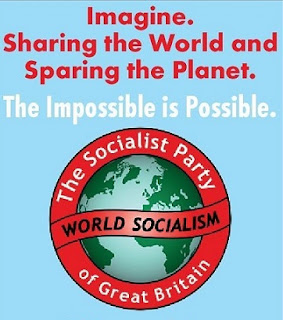Social revolution is the essential objective of the World Socialist Movement, the end towards which every step it takes must directly tend. It will be an emancipated world, a society of economic and social equals without class divisions or privileges; a system of social ownership of the means of production industrially administered by the workers on an organised and harmonious plan, ensuring from everyone according to one’s capacity and to everybody according to needs, under the motto “All for each and each for All”.
Governments representing capitalists, having strained every nerve to strangle workers’ resistance are now all the more determined to prevent its example from spreading, and are ready to adopt every method to that end, from diplomatic chicanery, false propaganda in the media, schools, pulpit and platform, economic intimidation, hypocritical appeals to patriotism, religious prejudice and racial fear or pride, to the brute force of the mailed fist and the iron heel wherever they dare. Lately, they have instituted a determined campaign all over the world to reduce wages. They are criminally conspiring to maintain as long as they can their decadent, outworn, slave-grinding system with its political expression, as a glance at any day’s news will show, it has not only failed to fulfil a single one of the promises still held out for it but, by crushing the workers with the perpetual dread or actuality of unemployment, starvation, repression, massacre and war, it is driving mankind ever deeper into the abyss. We hold aloft the glistening banner of World Socialism to be when the class war shall have been forever stamped out when mankind shall no longer cower under the bludgeon of the oppressor, when the necessaries and amenities of life, the comfort and the culture, the honour and the power, shall be to all and when none shall be called master and none servant, but all shall be fellow workers in common.
As far as socialists are concerned, states have always been in the pocket of unaccountable business cliques, and have always worked in their interest. Many of the states whose “sovereignty” will be infringed are already corrupt and toadying lackeys to our corporate masters, with despotic elites living the life of Riley out of ill-gotten plunder from environmental despoliation and pillage, wealth almost literally torn from the bodies of the world’s poor.
Some capitalists understand their system better than others or are more honest about it. George Soros, who made fortunes speculating in currency markets, does not regard capitalism as a stable or self-regulating system. In an interview, which has become particularly relevant now, he said: “Markets can move in unexpected ways and become chaotic. I’m afraid that the prevailing view, which is one of extending the market mechanism to all domains, has the potential of destroying society. Unless we review our concept of markets, our understanding of markets, will collapse, because we are creating global markets, global financial markets, without understanding their true nature. We have this false theory that markets, left to their own devices, tend towards equilibrium.” Speaking of market fluctuations, he said that if they become too large, “you can have a breakdown. It will come through political and eventually military events, rather than events merely in the financial markets”.
There are those who are given to the utterly absurd contentions that induce members of the working class to give allegiance to flags and patriotic clap-trap. In terms of working-class life, it is irrelevant. History is a sequential process, each chapter being an intermix of the past and the present. People do not take those political decisions that then become history with the freedom of an artist choosing a colour from a palette; on the contrary, though political decisions may be fashioned to serve the dominant economic interests, prevailing ideas handed down from the past play a vital role in the acceptance or rejection of such ideas. If history was simply a reflex of material interests, the matter may have ended there but, as Marx pointed out, while we make our own history, that history is contained to a greater or lesser extent by the dead hand of the past.


.jpg)


.png)

.jpg)
